Knife Sworn is the second book in the Tower and Knife trilogy, following the excellent debut of Mazarkis Williams, The Emperor's Knife, which was released back in 2011. The third book in the series, The Tower Broken is already available. There's no word so far on Williams' next project and we still don't know officially if the author behind the pseudonym is a man or a woman... (I thought Williams was a man back when I reviewed the first book but your guess is as good as mine...).
After spending most of his life in captivity, Sarmin now sits upon the Throne of Cerana. But his reign is an uneasy one. And the emperor’s own heart is torn between two very different women: Mesema, a Windreader princess, and Grada, a lowborn untouchable with whom Sarmin shares a unique bond. In times past, a royal assassin known as the Emperor’s Knife served to defend the throne from menace, but the last Knife has perished and his successor has yet to be named. Sarmin must choose his own loyal death-dealer . . . but upon whom can be he bestow the burden of the Knife-Sworn?When I finished The Emperor's Knife, I thought that it would have been complete as a standalone but I was confident enough in the author's skills with what I discovered in his debut to expect an intrigue worthy of a trilogy. I mention the intrigue specifically since it was the prime factor for which I enjoyed Williams' debut. The characters were not in rest though, Sarmin the young brother of the Emperor and new magic user out of his confinement was fascinating, Eyul the Emperor's Assassin with a hearth of gold felt familiar but surprised me, Mesema the young wife-to-be from the nomads offered a nice female point of view and Tuvaini the High Vizier was more than compelling with his own schemes. The Many. The Pattern Master. A wonderful cast.
While the tone for the second book remains mostly the same, the tapestry of intrigue feels less refined. This impression is kind of weird since the tale of Knife Sworn is confined within the city of Nooria, hearth of the Empire of Cerana and focuses much on Sarmin's rule and lineage. An invasion by the rogue soldiers of the Empire is taking place far away and we are kept informed about it by the presence of dignitaries and episodes of channeling into remnants of The Many for Sarmin but in the end, we don't see much aside from the apartments of the Emperor and his staff and family. The worldbuilding is on hiatus and we don't learn much more from the magic in Williams' world.
Tuvaini, Eyul and Mesema aren't points of view anymore (some for obvious reason that I won't mention to avoid spoiling someone who hasn't read the first book and some for unknown reasons). Instead, aside from Sarmin who's still at the center of the story, the new 'players' or forefront runners in this game of power and protagonists given a major point of view are Nessaket, Sarmin's mother, Grada, one of The Many and Rushes, a servant who gets involved despite herself but who offers a perspective more distant from the internal struggle for power. However, I have to admit that the addition of three female points of view is great.
The three of them are not without relevance and they propose fascinating moments but they don't come close to my appreciation of the characters we have learned to know in The Emperor's Knife. Nessaket, with her obsessions is offering a curious perspective from a hard woman with a mother's heart but a craving for control close to despair. I grew to like her chapters the more they appeared. There's almost no romance anymore (not that I yearn for it that much mind you...), Sarmin's dreams are somewhat hard to follow most of the time and the disappearance of the Pattern created a hole in the cohesion of the overall plot that is hard to fill even with the leftovers of the downfall of the Pattern Master. At least, in the end, a definite feeling of dread aside from the machinations to unbalance Sarmin's rule is coming back and there seems to be a worthy challenge to rise to, for Sarmin's sake.
Williams' writing is still as concise, without fuss or dispersion toward long descriptions. A fast read with some highlights but my overall perception of Knife Sworn is of an interlude in the aftermath of the first book (yes it's a bridging novel and in this case that's not actually a good thing) catapulting the story toward a cataclysm that makes the plotting of the hungry for power seem frivolous. In the first novel, both the intrigue and the story to save the world were working well together but that balance was upset. I think that Mazarkis can still pull it off in the third opus to finish the series in a more interesting manner (thanks in part to the return of Mesema back as a PoV). I'm not as eager now to finish the series but I will eventually.
Technically, I think the Jo Fletcher Books cover isn't bad, it a good representation for the book. The same map as the one for the first book is present, but less useful this time and the paperback edition of the book stands at 390 pages.
Knife Sworn review rating :




































